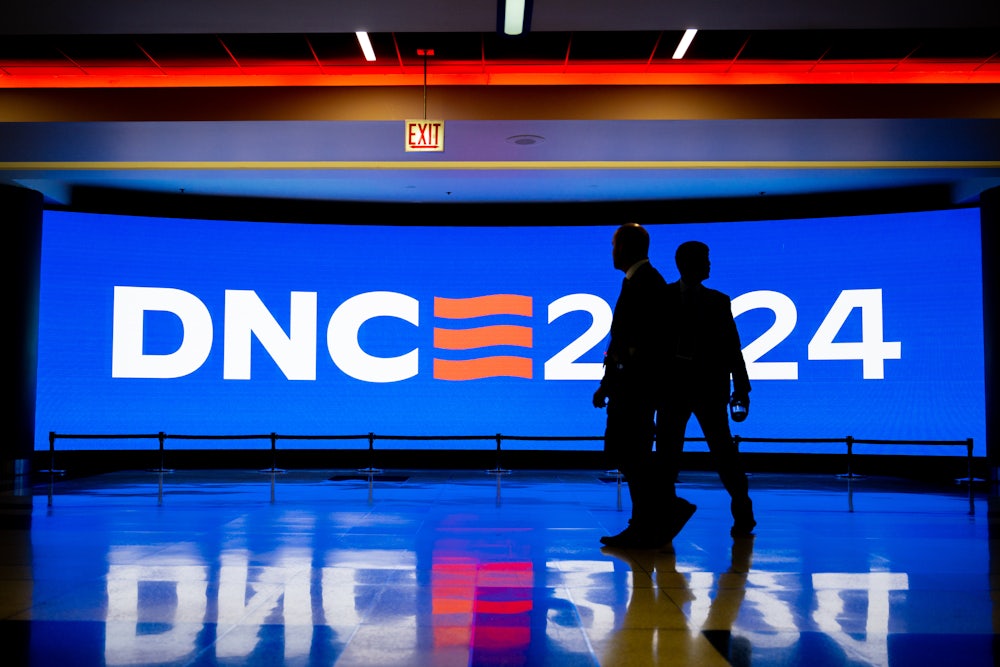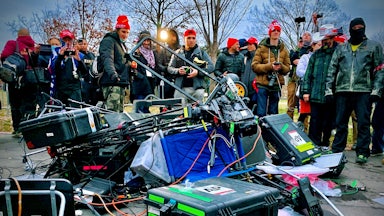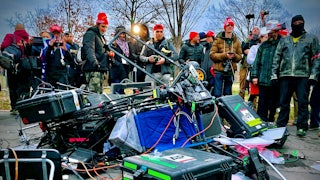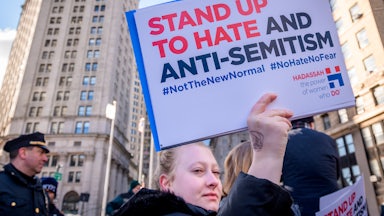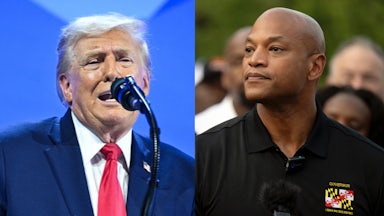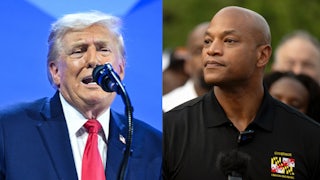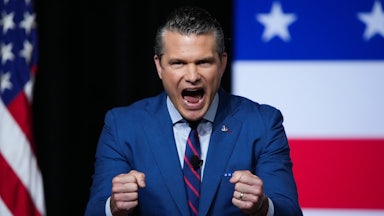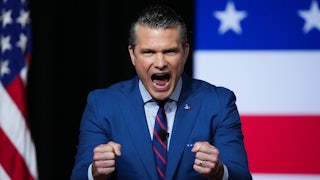It’s one of those moments that is tattooed on your brain forever—if your brain is the kind that is fully occupied by an encyclopedic memory of inane political moments that normal people forget: Donald Trump steps out onto the stage for the first debate of the 2016 Republican primary, fields the first question, and retorts, “Only Rosie O’Donnell,” when debate moderator Megyn Kelly, then of Fox News, reminded him, “You’ve called women you don’t like ‘fat pigs,’ ‘dogs,’ ‘slobs,’ and ‘disgusting animals,’” et cetera.
From the vantage of 2024, that Rosie O’Donnell jab is just one of thousands of ephemeral, pointless, and mean Trump utterances sloshing around in his larger ocean of vitriol. But what I remember most vividly was not the Rosie O’Donnell line itself. It was how every other candidate on stage—Republican robots in navy suits, white shirts, and red ties—short-circuited before our eyes. Everyone else in that debate (a veritable murderer’s row of forgettables like Jeb Bush, Marco Rubio, Ted Cruz, Chris Christie, and Scott Walker) had arrived preprogrammed by Washington, D.C.’s unwritten rules of political theatre, honed over decades of recycled bookings on Sunday morning’s vacuous matinees: Meet the Press, Face the Nation, and This Week.
Trump was unique among that field of suits in that he did not slide from Polite Washington’s slick political candidate widget factory. He didn’t care to perform the same canned lines on tax rates, entitlements, or the national debt. And he showed the world that audiences didn’t care about that long-running political vaudeville act, either. The Trump era, however you define it, yielded few gifts and cured little about the broken political discourse coming out of Washington. But if it didn’t wreck the political press’s performative vacuity, it at least exposed it for all to see.
Now, with nearly four years of Trump out of the White House, Trump back on the trail, and a Democrat at the top of the ticket who can actually campaign, the gap between the Beltway Truman Show and what people outside of D.C. actually are experiencing is widening. And this rift in reality imperils the media at a time when journalism is fighting a multifront war against anti-truth Republicans, declining revenue, and predatory venture capital mismanagement.
When Trump burst onto the scene, I was still a reporter in Washington covering national politics and Congress. I watched as the journalism-industrial complex of D.C. reporters and operatives around me tried to cast Trump as an atypical candidate who blew up the Republican Party. Casting Trump as an outlier—trying to make him an aberration instead of an outgrowth of a decades-long Republican effort to break our country—obscured the collective national gaze from something much more troubling for the people who make their living on politics: Trump didn’t break the Republican Party at all. He just broke the made-up Washington rules that empowered every lobbyist, reporter, and staffer to attend parties together without fear or reservation.
Trump disrupted the Washington status quo of White House Correspondents Dinners, of bipartisanship as an outcome agnostic to the policies brokered by those arrangements, of speculative horse-race coverage as seemingly innocuous instead of the over-juiced, monetized, and corrosive clickbait driving our country to the brink of authoritarianism.
As this class of political elites descends on Chicago this week for the Democratic National Convention, the average consumer of news needs to know they are not really coming here to workshop policy, interpret or execute progressive politics, or even discuss electoral strategy. They’re coming to attend corporate-sponsored happy hours, eat free meals together at the CNN Grill, and maybe, if they’re really lucky, snag a selfie with John Legend.
And now, more than ever, we should ask who all of this—this punditry, this hobnobbing, this navel-gazing—is really for.
Because if this summer has revealed anything, it’s that, just like the Scott Walkers of yore, we are watching the national media short-circuit before our very eyes. They are insular. They are unprepared. And after years of watching Morning Joe and searching for their birthdays in the Politico Playbook, they do not see their role as speaking to us, but rather speaking to themselves. While this may seem ancillary to the main plotline of our national politics, the mainstream media own-goaling themselves out of civic relevance is a net negative for anyone who believes in the outcome of better, more representative, good government.
For years, largely because Republicans are better at working the refs and crying foul about any effort by the media to hold them accountable for their actions, the idea that the media are dyed-in-the-wool liberals has become the orthodoxy. Of course, the Beltway media are conservative. This is not a novel argument by any means: It’s an industry run by (increasingly reactionary) plutocrats, who reliably summon their charges to lead a highly effective, “But how will you pay for it?” pincer movement against anything resembling liberal policy. Meanwhile, there is seemingly no sin grievous enough to earn a Republican the same sort of nullifying skepticism—the Trumpists who aided and abetted the former president’s attempt to overturn a lawful election remain in the good graces of America’s cable news bookers.
Still, we need to acknowledge that the media are conservative in the most traditional, unideological sense of the word: They are clinging to a status quo, their status quo, that has not matched our reality since Barack Obama was elected president in 2008 and the Tea Party emerged as the energized manifestation of Ronald Reagan’s 1980s fever dreams. Their rules, their conventional wisdom, their savvy takes become more stale, more detached from normal life, and more cartoonish with every passing day.
The roller-coaster news cycle of this summer has revealed not only how little the media have learned from the Trump era of politics, but also how badly they want their little old world back, one where Republican operatives dressed as cable news pundits can shape the decision-making of the Democratic Party, “sensible” Democratic leaders are the ones who tack to the right to win over voters and politicians who can never be won, and everyone can grab a martini at Café Milano—Washington, D.C.’s version of what the late Anthony Bourdain would call “The Despots’ Club”—and laugh about it afterwards.
Let’s consider the past few weeks in the life of The New York Times. This summer, the paper of record demanded President Joe Biden’s departure from the race. After getting their wish, they had criticism galore, which they expressed by pushing full stories on crystals-loving Marianne Williamson’s complaints that the party needed an open nomination process (without regard for the legal and logistical impossibility of such a process), followed by multiple columns chastising the elevation of the current Vice President, Kamala Harris, to the top of the ticket as a “coronation” (again, despite the fact that she was the only Democrat in the United States who could actually surmount the aforementioned legal and logistical challenges).
They got what they wanted but, oh no, not how they wanted it! And when the veepstakes didn’t go to their precise specifications they then found a half dozen of Minnesota’s nearly six million residents to say they do not love Governor Tim Walz, Harris’s pick for a running mate, even as his favorability jumped 20 points after his announcement. Finger on the pulse, baby!
It is as if the media are actively trying to direct chaos or uncertainty because chaos and uncertainty would create something new or interesting to them—a good show—which is what they’ve decided the news is about. As our country has inched closer to collapse, as we are not even a full presidential cycle away from Trump sending insurrectionists to the Capitol to murder members of Congress and his own vice president to steal an election, this direction seems clumsier and more desperate than it’s ever been.
During no event was this media disconnect from reality more evident than at the August 7 announcement of Walz as Harris’s number two on the ticket. Watching CNN, you would have thought that Harris had made a fatal error, that she was antisemitic and politically radical—despite being married to a literal Jewish person and having no such political record—for opting against Pennsylvania Governor Josh Shapiro. Anchor Jake Tapper could not process how Harris could have chosen an effective, proven Democratic legislator over an anti–public education governor whose state needed to pay almost $300,000 to settle a sexual harassment case involving Shapiro’s top liaison to the state legislature, who also happened to be Republican. Reporters and the Republican operatives-turned-pundits who are permanently seated next to them were flabbergasted, as a person with actual agency went against the stage direction they had coalesced around.
Meanwhile, the images from the stadium at that very moment, which we could all see, showed thousands of people finally energized by and enthusiastic to support a ticket comprised of two fully animate human people who could put together cogent sentences about what it means to be a Democrat. Not to mention applause lines on how the GOP’s vice presidential pick is a weirdo. If the media’s job, in part and during live events, is to document what they are seeing to translate those observations to an audience, it appears they would prefer to create a fantasy world to talk about, rather than simply discuss what’s plainly in front of their faces.
Which brings us back to the Democratic convention. It’s impossible to know every flaw or fault this chattering class will find in a convention that does not feature a lineup of Kid Rock or Hulk Hogan, or cheer on the likes of Hungarian strongman Viktor Orban or any of a number of extremely creepy and weird religious zealots. But you can bet there will be pearl-clutching about how Democrats are not reaching for a middle that is actually center-left, how clear articulations of the threats Trump poses to democracy constitute dangerous political rhetoric, and whether Democrats can win white votes using every euphemism for “white voter” that you can imagine.
Do not let these talking heads fool you into thinking that normal, commonsense people or ideas—like keeping kids out of poverty, safe from being shot in school, and free to read books of their choosing at their public libraries—are fringe. We can see with our eyes what’s happening before us, and we know the stakes of what lies ahead even if that understanding does not make us as savvy as them.
Let them go to their parties, drink their cheap house wine on some grifting consultancy’s dime, and sneer amongst themselves behind our backs. I’ll be watching C-Span until they figure out their real responsibility or democracy completely collapses, whichever comes first.
